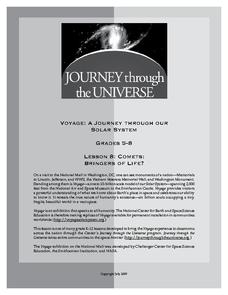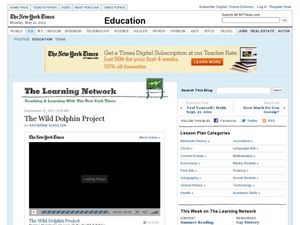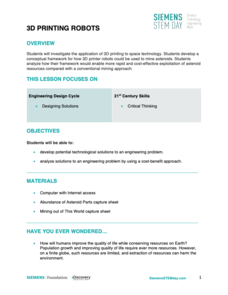NOAA
Currents
Learn how ocean currents are vital to humans and marine life. The eighth installment of a 23-part NOAA Enrichment in Marine sciences and Oceanography (NEMO) program, focuses on ocean currents and how they affect global climate. The...
Curated OER
The Science of Thinking
How is fixing a flat tire like reading and writing? By thinking about each activity properly - identifying the problem and purpose, gathering information, and making inferences - you can exercise your thinking skills equally. This...
Journey Through the Universe
Comets: Bringers of Life?
Young scientists investigate the elements found in our solar system and then construct a model of a comet. They apply their new knowledge to the formation of the solar system.
Curated OER
Medical Explorer
After reading a case study, pupils will explore possible diagnoses, assessment, and treatment plans. Finding the definitions to medical vocabulary and sorting through patient history, they will begin to understand the process of...
NASA
The Atmospheric Filter
What is the difference between a comet and a meteoroid? An educational lesson includes five demonstrations of how the atmosphere can inhibit our ability to measure many things in the galaxy.
Curated OER
The Wild Dolphin Project
Inspire young marine biologists to study animals in the wild with this assignment. Pupils view an eight-minute video and read an article in the New York Times about Denise Herzing's 25-year long study of dolphins in their own...
Desert Discoveries
Sonoran Desert ABC's
Third graders make alphabet cards that depict the wide variety of life forms found in the Sonoran Desert. A terrific lesson plan that combines language arts, visual arts, and life science all into one wonderful package. Each of the cards...
Curated OER
Sexual Health and Hygiene
By examining harmful health and hygiene practices, teens will be able to determine what is best for their body. Advertisers for health/hygiene products will also be evaluated for "best interest" criteria. The class will begin by...
Mr. E. Science
Climate and Climate Change
What factors make up climate? How does longitude and latitude affect climate? What is causing Earth's climate to change? These questions are the topic of a presentation that explains characteristics of climate and climate change.
Discovery Education
3D Printing Robots
What is water worth to you? The answer probably depends on many different variables. Learners explore the value of water in space and what it takes to transport the resource to locations in a galaxy far far away. They then consider...
Curated OER
Studying our Senses
Who would not want an opportunity to taste jellybeans in class? During this investigation, life science learners hold their noses as they take a taste test and find that our perception of flavor is connected with our sense of...
NOAA
Tides
Low tides, high tides, spring tides, neap tides, diurnal tides, semidiurnal tides, mixed tides ... just how many types of tides are there? The 10th installment of a 23-part NOAA Enrichment in Marine sciences and Oceanography (NEMO)...
Desert Museum
Daisy Ecology
Here's a fine activity that combines poetry with life sciences. Learners carefully listen to a poem that's all about a food chain. As the poem is read, learners name the producer, the herbivore, the carnivore, and the omnivore. Lots of...
Curated OER
Tree Cookies
You will find a viewer-friendly PowerPoint on the growth rings and other features found in a cross-section of a tree trunk, affectionately known as a "tree cookie." A few worksheets are provided for practice counting tree rings and a...
Project Oceanography
Fish Shape
A fish's size, fins, and shape can tell us a lot about them! Learners explore fish anatomy to see how species use camouflage, scales, shape, and coloration to survive. The lesson includes advanced vocabulary such as fusiform shape,...
California Department of Education
Possible Careers
Is a STEM career the right choice for me? Lesson four in a six-part career and college readiness series introduces seventh graders to the world of STEM occupations. Individuals use their Holland code results to select, research, and...
Kenan Fellows
How Much Energy Is That Anyway?
The fifth lesson in the six part series introduces units of energy including calories, Calories, and joules. Scholars determine the energy released when eating a snack and during activity.
Space Awareness
The Big Meltdown
Explore the world (our world) of melting ice caps. Why are these caps melting? What is the effect of melting ice caps? Dive into the ever-present issue of global warming with a resource that has learners looking at data and participating...
Alachua County Public Schools
Food Chain
Two to four players receive seven cards each, with plants, animals, or nitrates depicted. They place what they have onto their own empty game board with the objective to complete a food chain. The game is a fun way to reinforce learning...
Curated OER
The Influence of Human Activity on the Environment
The surge in human population in the last 2,000 years, due in large part to better health care, has brought a surge in the demand for resources and in pollution. The graphics, photographs, and real-life examples in a thought-provoking...
Illustrative Mathematics
Solar Eclipse
Learners take on the role of astronomers, calculating conditions necessary for a total solar eclipse. Concepts of similar triangles and properties of circles come together as pupils create ratios and use real measurements in determining...
Cold Spring Harbor Laboratory
DNA Is Only the Beginning for Understanding the Human Genome
Mario Capecchi requested funding for a new procedure targeting genes and was rejected. Four years later, after he proved it worked, the NIH apologized and funded his research. Use an online interactive to learn about his research and the...
National Nanotechnology Infrastructure Network
Gelatin Microfluidics
Micro what? Analyze microfluidics as an application in the medical community. A lab investigation highlights the importance of channel design in biotechnology. Learners modify channels and observe the behavior of the flow of the fluids.
Curated OER
Urban Life: What Lives in Our Schoolyard?
Students research living organisms by exploring their school grounds. For this microscopic observation lesson, students gather materials, insects, and objects from their playground and schoolyard and bring them into class. Students...























